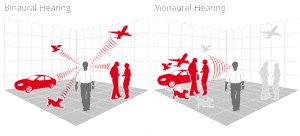
MED-EL
Published Apr 04, 2014 | Last Update Aug 02, 2024
6 Ways to Practice Your Sound Localization
If you have only one hearing implant, or hear with only one ear, have you ever thought about getting a second implant? Ever wondered what benefits that hearing with your other ear would give you?

The truth is, there are a few different things that only happen when someone has two ears. To help answer your questions I’m going to use a few blog posts to explain each one in a bit more depth. So, let’s start with the first one: “sound localization.”
How Can I Benefit from Sound Localization?
Sound localization means being able to tell where a sound is coming from: Is it to your left or is it to your right? Is it moving towards you, or away from you, or is it standing still? When you localize sounds you can know the answers to these questions. There are two big reasons why this is a good thing.
The first is that, well, you know exactly where a sound is. This means that you can tell if it is moving towards you or away from you, or if it’s moving from left-to-right or right-to-left. Sometimes you can even predict where a sound will move next! When you can do this, you are able to feel as if you are in the three-dimensional world even when your eyes are closed.
Sound localization also helps improve speech understanding. When you can use your hearing to know where your friends are, you can more easily turn towards them and then listen with both your implants. And in noisy situations, turning towards the person that is speaking will help you to hear them louder and more clearly than the background noise coming from other directions.
How Does My Brain Localize Sounds?
The key to sound localization is hearing from both sides.

Sound localization means that you can hear sounds all around you, and know where they are.
If you’re curious how this works, just imagine that you’re sitting and looking forward. A piano is playing on your right side. If you have only one functional ear or implant, then you have only one point of reference: you might be able to guess how far away it is, depending on how loud it is, but you won’t be able to tell which direction it’s is coming from.
With two ears or implants your brain hears each of these sounds slightly differently. One implant will hear it more loudly, and slightly before, the other implant. For example, when the piano is playing off to your right, its sound will reach your right ear before your left and it’ll be slightly louder in your right ear. It’s these differences that the brain uses to realize that this piano is off to your right.
How Can I Practice Localizing Sounds?
If you want to practice your sound localization, there are different activities that you can do to improve your skills. Here are a six that we’ve put together that you can practice alone or with a friend:
- Recognize and localize a known sound that occurs in a known spot (like the telephone at your house, where it normally sits).
- Recognize and localize a known sound from an unknown spot (like the telephone in your house, except moved to somewhere new).
- Recognize and localize an unknown sound from an unknown spot (have someone else pick out what, and where, the noise comes from).
- Recognize and localize a known sound from a known spot, with background noise.
- Recognize and localize an unknown sound from an unknown spot, with background noise.
- Track a sound as it moves between different spots.
As you keep working on your sound localization, make sure to practice every day. Depending on your specific hearing it may take months until you can comfortably localize sounds. That’s okay! Everybody’s hearing is different so just keep in touch with your audiologist to check your personal progress.
References

MED-EL
Was this article helpful?
Thanks for your feedback.
Sign up for newsletter below for more.
Thanks for your feedback.
Please leave your message below.
Thanks for your message. We will reply as soon as possible.
Send us a message
Field is required
John Doe
Field is required
name@mail.com
Field is required
What do you think?
© MED-EL Medical Electronics. All rights reserved. The content on this website is for general informational purposes only and should not be taken as medical advice. Contact your doctor or hearing specialist to learn what type of hearing solution suits your specific needs. Not all products, features, or indications are approved in all countries.

MED-EL

MED-EL


